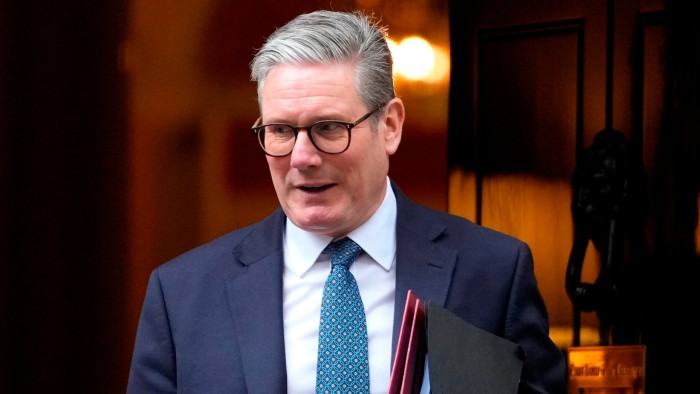Sir Keir Starmer has blown a £4.25bn hole in his budget after retreating on cuts to disability benefits and pensioner subsidies, raising the likelihood of further tax rises and damaging his government’s credibility with investors.
The UK prime minister on Thursday gave rebellious Labour MPs about £3bn worth of concessions on planned cuts to welfare spending, just weeks after he reversed on cutting winter fuel payments for pensioners at a cost of £1.25bn.
Starmer, who swept to office last July in a landslide election victory, has made his huge parliamentary majority a core part of his pitch to investors, arguing that the UK government has the stability and strength to take tough decisions. But that argument had now been undermined, investors said.
“These U-turns are going to weaken the PM’s ability to take difficult decisions as his authority has clearly been challenged by the Labour parliamentary party,” said Nicolas Trindade, senior portfolio manager at Axa’s asset management arm.
The decisions “will make it much more difficult for the chancellor to keep her fiscal headroom intact and significantly increase the likelihood of tax increases at the Autumn Budget”, he added.
Chancellor Rachel Reeves in March left herself with a razor-thin £9.9bn margin against her key fiscal rule of eliminating the deficit on day-to-day spending by 2029-30.
The fiscal pressure on Starmer and Reeves may increase further in the coming months, with the economy predicted to weaken after a strong first quarter. Labour MPs may also be emboldened to push the government to scrap the two-child cap on benefits, inherited from the last Conservative government, a move that would cost £3.5bn a year.
Reeves has also considered watering down her October Budget raid on non-dom taxpayers to stem an exodus of wealthy residents, which would affect tax revenue projections if she softened the reforms.

The welfare U-turn “adds to the challenges they face”, said Andy King, a former official at the UK’s fiscal watchdog the Office for Budget Responsibility.
“This is several billion pounds since the Spring Statement that has to be found come the autumn and there are lots of other headwinds that need to be addressed too,” said King, who is now at consultancy Flint Global.
Another tax-raising Autumn Budget was “increasingly likely”, he added. “There is scope for it to be a material number.”
The UK’s 10-year borrowing costs reached a 16-year high above 4.9 per cent in January, amid a global bond sell-off and worries about the UK’s fiscal position, before falling back in recent months. Gilts were fractionally weaker on Friday, pushing the 10-year yield up 0.04 percentage points to 4.51 per cent.

“Market participants have largely priced in the likelihood of tax increases in the Autumn Budget, and Starmer’s U-turn on welfare cuts simply reinforces that view,” said Mujtaba Rahman, managing director for Europe at consultancy Eurasia Group.
“Markets clearly see that the government’s fiscal strategy is a bit of a mess and will require a further course correction later in the year,” he added.
Starmer has said his welfare reforms are designed to address the 2.8mn people in the UK who have a long-term health condition that prevents them from working.
The Labour government had hoped to save £4.8bn a year by cutting welfare payments, but the party’s MPs have been queasy about taking money away from vulnerable disabled people.
Analysts at the Resolution Foundation and Institute for Fiscal Studies said the compromise Starmer offered on Thursday could reduce the planned savings by about £3bn a year.
Starmer offered to limit cuts to Britain’s main disability benefit to new claimants after November 2026, increase health payments under a different benefit in line with inflation for existing claimants, and accelerate a £1bn package of employment support.
He conducted a ragged retreat after more than 120 Labour MPs vowed to vote down his welfare legislation at its second reading next Tuesday.
Some leading rebels welcomed the climbdown, including Meg Hillier, chair of the Treasury select committee, who said: “This is a good and workable compromise and shows that the Labour government has listened.”
Yet dozens of Labour MPs are still expected to vote against the legislation, including most of the “Campaign group” of left-wingers such as Nadia Whittome.

“If the government doesn’t pull the bill, doesn’t consult properly with disabled people and come back to MPs with a serious proposal that protects the dignity of disabled people, I will vote against and I will be far from the only one,” she told the BBC on Friday.
One concern among the hardcore rebels and disability groups is that the government will create a “two-tier” system whereby new applicants for personal independence payments (Pips) will be treated more harshly than existing recipients.
Downing Street on Friday said “the government has listened to MPs who support the principle of reform, but are worried about the pace change”. A spokesperson added that the reforms were still “meaningful” and said it was “not unusual to have different rates” for Pips.
Starmer’s government has not detailed how it will fund the changes to its plans on welfare and winter fuel payments, other than to say that there will be no “permanent” increase in borrowing.
Spending cuts will be challenging as the Treasury only recently set departmental budgets for the next three years after a painful spending review. Raising taxes will also be politically difficult. Reeves is still grappling with unhappiness over her £40bn of tax increases in last year’s Budget, and she has vowed not to raise taxes on “working” people.
Kemi Badenoch, Conservative party leader, said Labour had created “a multi-billion-pound black hole that can only mean higher taxes or more borrowing”.
Mark Dowding, chief investment officer for fixed income at RBC BlueBay Asset Management, said Starmer’s government was suffering from “fiscal slippage”.
The gilt market “may push the government to hike taxes in order to satisfy market concerns and avoid a repeat of the Truss tantrum”, Dowding warned.







